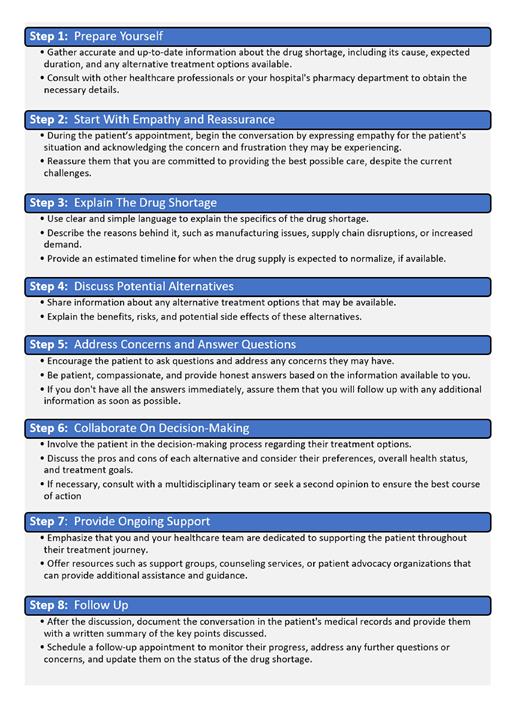Introduction: The United States finds itself gripped by debilitating drug shortages, thrusting thousands of patients nationwide into a precarious limbo and making the potential delay or cancellation of essential chemotherapy treatments a reality. In June 2023, the situation escalated to encompass a staggering 309 active drug shortages, including twenty-five chemotherapeutics, two of which are carboplatin and cisplatin. Communicating the nuances of a chemotherapy drug shortage to those affected transforms into a multifaceted and delicate endeavor that demands deep-seated empathy, preparation, and understanding. Mastering strategic, patient-centered communication becomes an ethical imperative and valuable skill for all physicians, amplifying the human connection at the heart of medicine.
Our multidisciplinary team of specialists developed an ethical communication framework to guide physicians in navigating and discussing the complexities of modern drug shortages with patients. This framework promotes empathetic and informative dialogue with patients, empowering them to understand the situation and actively participate in their care decisions. Through this approach, we aim to foster a partnership between physicians and patients, mitigating anxieties and ensuring patients feel heard and supported throughout this trying period.
Method: A multidisciplinary team of specialists convened, including physicians, advanced practice providers from hematology and oncology, and bioethicists. We developed an ethical and theoretical communication framework that will prove beneficial for both physicians and patients. Our framework facilitates compassionate and informed exchanges between healthcare professionals and their patients. Special care was given to consider the patient's background, perspectives, and beliefs.
Results: The ethical communication framework for addressing chemotherapeutic shortages demonstrated promising potential for enhancing patient-provider interactions during times of crisis. The framework emphasizes open and transparent communication, facilitating patient understanding of the drug shortage situation and empowering patients to participate in their treatment actively.
Conclusion: The developed ethical communication framework offers a patient-centered approach to addressing this crisis, aiming to empower patients with knowledge and understanding while fostering a collaborative decision-making process during crisis communication. By prioritizing empathy, transparency, and patient autonomy, the framework serves as a valuable tool for navigating the complexities of drug shortages and mitigating patient fears when discussing the drug shortage crisis. As the framework continues to be integrated into healthcare systems, ongoing evaluation and tracking of patient outcomes will provide valuable insights into its effectiveness and potential areas for improvement in communicating the crisis.
Through strategic and empathetic patient-centered communication, physicians can play a crucial role in supporting patients during the national drug shortage crisis, ensuring that patients' voices are heard and their needs are addressed with compassion and understanding when communicating the crisis.
Disclosures
Locantore-Ford:Cardinal Health: Consultancy, Honoraria; Accumen: Consultancy, Current Employment, Membership on an entity's Board of Directors or advisory committees.


This feature is available to Subscribers Only
Sign In or Create an Account Close Modal